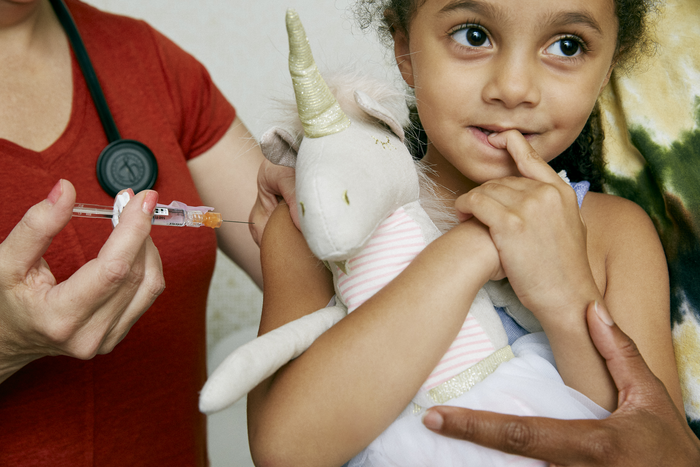Tears, tantrums, and distress – when it comes to needles, many children struggle with anxiety. But with vaccinations becoming more regular, finding ways to help reduce needle-related fear and pain is high on the agenda.

Credit: “Young girl about to receive a vaccine from a medical professional” by SELF Magazine is licensed under CC BY 2.0.
Tears, tantrums, and distress – when it comes to needles, many children struggle with anxiety. But with vaccinations becoming more regular, finding ways to help reduce needle-related fear and pain is high on the agenda.
Now, new research from the University of South Australia shows that children’s vaccination and needle fear can be lessened when nurses spend additional time supporting children in the vaccination process.
Working with children aged 8-12 years, the preliminary study found that two new nurse-led techniques show promise in reducing needle fear in primary-aged children:
- Divided Attention – where a child’s attention and expectations are drawn away from the needle.
- Positive Memory Reframing – where a child’s exaggerations about the distress and discomfort of needles are redressed through discussion about the positive elements of the experience so that the form more realistic memories of the event.
Lead researcher, UniSA’s Dr Felicity Braithwaite, says helping children reduce fear and distress around vaccinations is a critical research priority given the current COVID-19 pandemic.
“For many children, undergoing a needle procedure can be painful and distressing,” Dr Braithwaite says.
“Negative experiences of vaccinations in childhood can often lead to medical avoidance and vaccine hesitancy into adulthood, which can have devastating consequences when it comes to outbreaks of preventable diseases.
“By investing more time into techniques to help children manage their fears about needles, we hope to change these outcomes and deliver better health outcomes for the next generation.”
The study involved 41 children and their parents, with participants randomly allocated to one of four groups – usual care, divided attention, positive memory reframing, or a combination of the latter two interventions. Clinical outcomes were assessed at baseline, immediately post-vaccination and at two-weeks post-vaccination.
The Divided Attention technique involved a one-two minute distraction game where a nurse tapped the child’s arm above and below the vaccination spot in a random order, with the child focussing their attention on guessing which spot was touched each time. This game takes advantage of the potential analgesic effects of distraction.
The Positive Memory Reframing technique involved talking to children about a past injection and emphasising positive aspects, such as how brave the child was and praising specific strategies they used to reduce their own distress, for example, deep breathing and looking away. The aim is to foster a sense of self-efficacy to help children better cope.
Both strategies were tested in non-clinical settings (such as schools) to maximise the potential of broad vaccination programs that deliver minimal distress for children.
…………………………………………………………………………………………………………………………
Contact for interview: Dr Felicity Braithwaite E: [email protected]
Media contact: Annabel Mansfield M: +61 479 182 489 E: [email protected]
Journal
European Journal of Pain
DOI
10.1002/ejp.1992
Method of Research
Case study
Subject of Research
People
Article Title
Reframe the pain: Divided attention and positive memory reframing to reduce needle pain and distress in children— A feasibility randomized controlled trial
Article Publication Date
5-Jun-2022
COI Statement
T.R.S. has received support from Eli Lilly Ltd for travel and accommodation cost (unrelated to the present topic) and receives payment for lectures on pain and rehabilitation. F.A.B. has received speaker fees for providing lectures related to pain and blinding in clinical trials. M.N., H.G.J., C.G.N., M.D.W. and E.W. have no conflicts of interest to declare.




